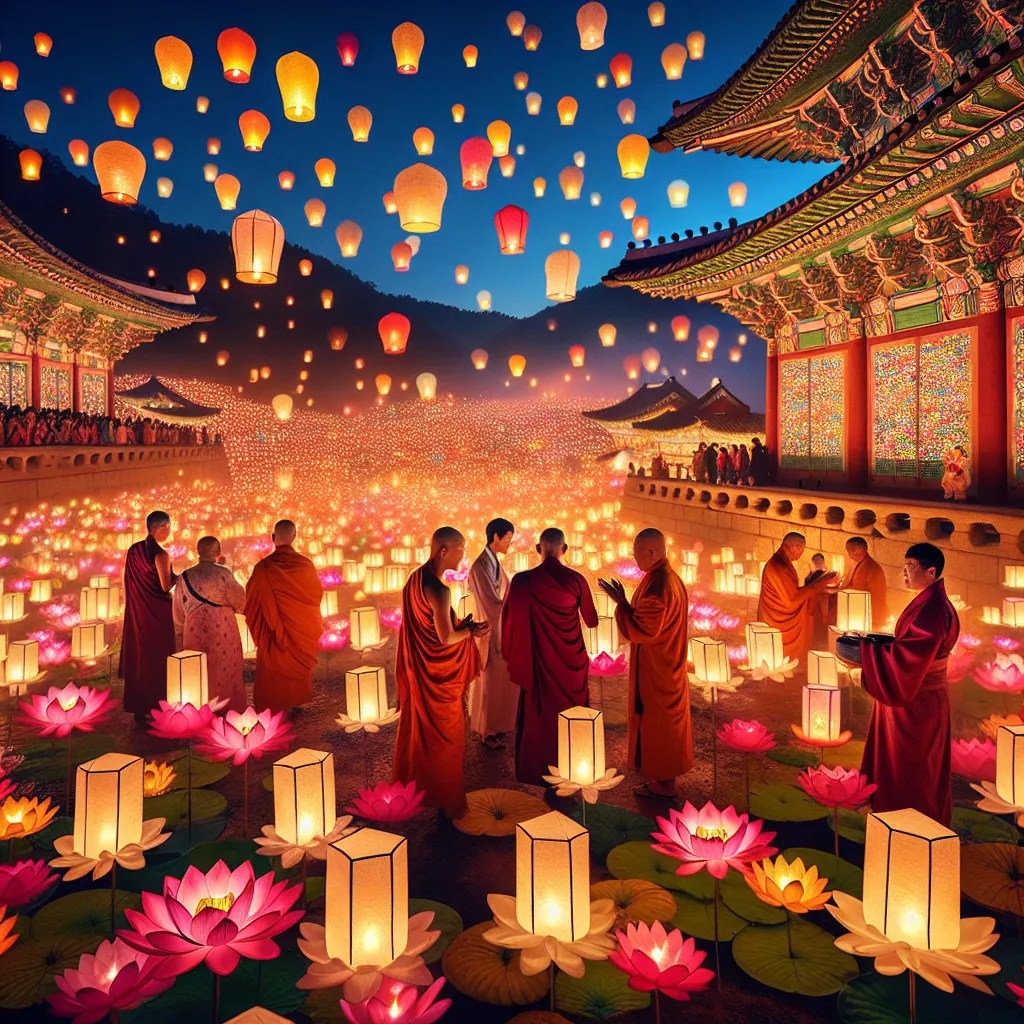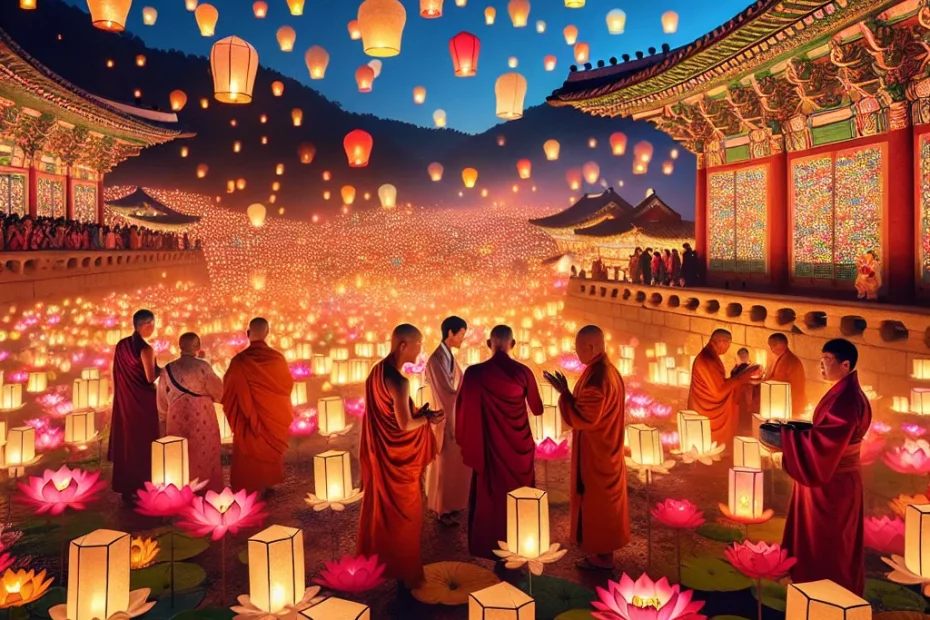As we delve into the vibrant celebrations of Buddha’s Birthday in Korea, we are met with a tapestry of traditions and customs that have endured through the ages. The Lotus Lantern Festival, with its mesmerizing display of lights, stands out as a symbol of spiritual enlightenment and joy. Engaging in a Temple Stay offers a unique opportunity to immerse oneself in the spiritual practices of Buddhism, fostering a deeper understanding of this ancient tradition. The cultural significance of lotus flowers, revered for their purity and beauty, adds a layer of symbolism to the festivities. Together, these elements create a rich tapestry of celebration, inviting us to explore the essence of joy and spirituality in the heart of Korean traditions.

Celebratory Traditions and Customs
Buddha’s Birthday, also known as “Seokga Tansinil” in Korean, is a significant and joyous occasion celebrated with great enthusiasm in South Korea. This annual event, which falls on the eighth day of the fourth month of the lunar calendar, is a time for both religious observance and cultural festivities. The celebration not only honors the birth of Siddhartha Gautama, the founder of Buddhism, but also showcases the rich traditions and customs that have been passed down through generations.
The Lotus Lantern Festival
One of the most iconic customs during Buddha’s Birthday in Korea is the Lotus Lantern Festival. This vibrant and colorful event features thousands of lanterns adorning temples, streets, and homes across the country. The sight of these illuminated lanterns, symbolizing enlightenment and the teachings of Buddha, creates a magical and awe-inspiring atmosphere for both locals and visitors alike. The festival also includes various traditional performances, parades, and ceremonies that highlight the beauty and significance of Buddhism in Korean culture.
Bathing the Buddha
In addition to the Lotus Lantern Festival, another cherished tradition during Buddha’s Birthday is the practice of “Bathing the Buddha.” This ritual involves pouring fragrant water over small statues of Buddha as a symbolic gesture of purification and renewal. By participating in this act of bathing, individuals seek to cleanse their own minds and hearts, reflecting on the teachings of compassion and kindness espoused by Buddha. This tradition not only holds deep spiritual meaning but also serves as a reminder of the importance of inner reflection and self-improvement.
Generosity and Giving
Furthermore, Buddha’s Birthday in Korea is a time for generosity and giving. Many temples and communities organize charity events and donation drives to help those in need, embodying the spirit of compassion and altruism promoted by Buddhism. People also engage in acts of merit-making, such as offering food to monks, reciting sutras, and practicing meditation, to accumulate positive karma and cultivate a sense of spiritual fulfillment.
Overall, the celebrations surrounding Buddha’s Birthday in Korea are a testament to the enduring cultural heritage and spiritual values of the country. Through colorful lanterns, meaningful rituals, and acts of kindness, the occasion brings people together in joy and harmony, fostering a sense of unity and reverence for the teachings of Buddha. It is a time of reflection, gratitude, and celebration, reminding us of the timeless wisdom and compassion that continue to inspire and uplift humanity. 🌸🏮🙏
Lotus Lantern Festival: A Spectacle of Lights
Welcome to the vibrant and enchanting world of the Lotus Lantern Festival in South Korea! This annual celebration, held in honor of Buddha’s Birthday, is a dazzling display of lights, colors, and cultural heritage. The festival is a time for joyous festivities, spiritual reflection, and community unity, drawing millions of visitors from around the globe.
The Symbolism of Lanterns
The Lotus Lantern Festival is deeply rooted in Korean Buddhist traditions, symbolizing the illumination of wisdom and the dispelling of darkness. One of the highlights of the festival is the mesmerizing lantern parade, where thousands of intricately crafted lanterns light up the night sky in a breathtaking procession. The sight of these colorful lanterns swaying gently in the breeze is truly a sight to behold, evoking a sense of peace and wonder.
Artistry and Craftsmanship
Each lantern in the parade carries a special meaning, with some depicting auspicious symbols, while others showcase intricate designs and patterns. The craftsmanship and attention to detail that goes into creating these lanterns are truly remarkable, reflecting the dedication and skill of the artisans who bring them to life. As the parade winds its way through the streets, accompanied by traditional music and dance performances, spectators are immersed in a magical atmosphere that is both festive and serene.
Cultural Activities and Experiences
In addition to the lantern parade, the Lotus Lantern Festival offers a wide range of cultural activities, including temple stay programs, traditional craft workshops, and Buddhist ceremonies. Visitors have the opportunity to participate in various rituals, such as lighting incense sticks, making lotus flower lanterns, and offering prayers for peace and harmony. These immersive experiences allow participants to gain a deeper understanding of Korean Buddhist culture and its rich heritage.
A Feast for the Senses
As day turns into night, the festival grounds come alive with vibrant performances, delicious food stalls, and interactive exhibits. From traditional dance performances to modern interpretations of Buddhist art, there is something for everyone to enjoy. The air is filled with the sounds of laughter, music, and the aroma of incense, creating a sensory feast for the soul.
A Spiritual Journey
The Lotus Lantern Festival is not just a celebration; it is a spiritual journey, a cultural extravaganza, and a testament to the enduring legacy of Buddhism in Korea. It is a time to come together, to reflect on the teachings of Buddha, and to bask in the warm glow of lantern light. So, if you ever find yourself in South Korea during this magical time of year, be sure to experience the Lotus Lantern Festival and witness the spectacle of lights that illuminates the heart and soul.
Experience the Magic
Experience the magic, feel the energy, and immerse yourself in the beauty of the Lotus Lantern Festival – a celebration like no other. Let the lights guide you, let the colors inspire you, and let the spirit of Buddha’s Birthday fill your heart with joy and peace.
Temple Stay Experience: Embracing Spiritual Practice
Embarking on a temple stay in Korea is not just a simple getaway; it is a profound journey into the depths of spiritual practice and self-discovery. The serene ambiance of ancient temples, the rhythmic chants of monks, and the simplicity of daily rituals all contribute to a transformative experience that transcends the ordinary.
🌿 Immersing in Tradition
During a temple stay, participants have the unique opportunity to immerse themselves in the rich traditions of Korean Buddhism. From early morning meditation sessions to engaging in traditional tea ceremonies, every moment is a chance to connect with centuries-old practices that have stood the test of time.
🙏 Mindful Reflection
The temple stay experience encourages introspection and mindfulness. Away from the distractions of modern life, visitors can take a step back, reflect on their thoughts and emotions, and cultivate a sense of inner peace. The practice of mindfulness permeates every aspect of the temple stay, fostering a deep sense of awareness and presence.
🌸 Cultural Exchange
Beyond the spiritual aspects, temple stays also offer a window into Korean culture and heritage. Participants can learn about traditional Korean architecture, explore the art of temple cuisine, and engage in cultural activities such as lantern making and calligraphy. It is a holistic experience that enriches both the mind and the soul.
🕯️ Connecting with Nature
Many temples in Korea are nestled amidst breathtaking natural landscapes, providing the perfect setting for contemplation and connection with nature. The rustling of leaves, the chirping of birds, and the gentle flow of streams create a harmonious backdrop for spiritual practice, allowing participants to find solace in the beauty of the natural world.
☯️ Balancing Body and Mind
Temple stays often include opportunities for physical activities such as temple stay yoga or hiking in the surrounding mountains. These activities not only promote physical well-being but also complement the spiritual practices, creating a harmonious balance between body and mind.
In conclusion, a temple stay in Korea is more than just a temporary retreat; it is a transformative journey that allows participants to embrace spiritual practice, foster mindfulness, and immerse themselves in the rich tapestry of Korean culture and tradition. It is a chance to step out of the hustle and bustle of everyday life and embark on a path of self-discovery and inner peace.
Cultural Significance of Lotus Flowers
In the realm of symbolism and cultural significance, the lotus flower stands as a timeless emblem of purity, enlightenment, and rebirth. 🌸 Across various cultures and religions, the lotus holds a profound meaning that transcends its physical beauty.
The Symbolism in Buddhism
In Buddhism, the lotus flower is highly revered as a symbol of purity and spiritual awakening. 🌺 Its ability to emerge from murky waters unblemished symbolizes the journey from darkness to light, mirroring the path to enlightenment. The different stages of the lotus, from bud to full bloom, represent the stages of spiritual growth and the unfolding of inner potential.
The Sacred Status in Hinduism
In Hinduism, the lotus holds a similar sacred status, symbolizing divine beauty, fertility, and prosperity. 🌼 The goddess of wealth, Lakshmi, is often depicted seated on a fully bloomed lotus, signifying purity and abundance. The unfolding petals of the lotus symbolize the expansion of the soul and the unfolding of spiritual consciousness.
Ancient Egyptian Association
Moreover, in ancient Egyptian culture, the lotus flower was associated with rebirth and the sun. 🌻 The daily blooming of the lotus at sunrise represented the cycle of life, death, and rebirth, linking it to the eternal journey of the soul.
The lotus flower’s significance is not limited to its symbolism in religious and cultural contexts. 🌷 Its practical uses in traditional medicine, culinary arts, and even as a source of inspiration for artists further highlight its multifaceted importance.
As we delve deeper into the cultural significance of the lotus flower, we uncover a rich tapestry of meanings that have endured through centuries. 🌺 Its ability to transcend boundaries and resonate with people across different backgrounds underscores its universal appeal and timeless relevance.
In conclusion, the lotus flower stands as a powerful symbol of beauty, purity, and spiritual growth, weaving a thread of connection between diverse cultures and beliefs. 🌸 Its enduring significance serves as a reminder of the eternal quest for enlightenment and the resilience of the human spirit in the face of adversity.
Buddha’s Birthday in Korea is a celebration filled with rich traditions and customs, showcasing the cultural significance of lotus flowers. The Lotus Lantern Festival dazzles with its spectacle of lights, while the Temple Stay Experience offers a chance to embrace spiritual practice. These joyous celebrations not only bring communities together but also provide a deeper understanding of Korean heritage and Buddhism. The beauty and symbolism of lotus flowers in these festivities serve as a reminder of the importance of peace, enlightenment, and unity in our lives. Embracing these traditions can bring a sense of connection to something greater than ourselves, fostering a spirit of harmony and joy in our hearts.
